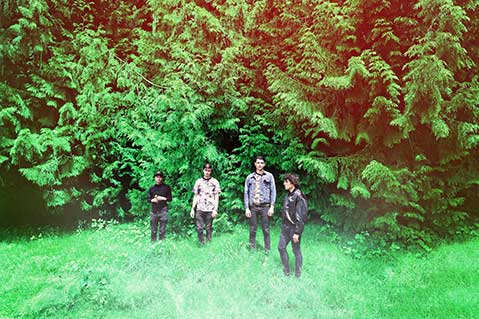White Arrows Get Free
L.A. Rockers Embrace the Space Between On In Bardo

Look up the term “bardo,” and you’ll uncover a spiritual treasure trove of information. The Tibetan word translates directly to an “intermediate state,” but it can also reference a specific Sanskrit idea involving the condition of existence that takes place between a person’s two lives. According to Buddhist teachings specifically, in this time between death and rebirth, our consciousness disconnects from our physical body, resulting in a whole slew of trippy phenomena.
Following an especially grueling start, L.A. band White Arrows latched on to the term in no small way. In 2012, the group’s quickly constructed debut put them on the road for the better part of two years. And when it finally came time to return home to write album number two, they all agreed that a rebirth was in order. Last September, White Arrows released In Bardo, an 11-track collection of psych-tinged guitar music that delivers moments of ecstatic dance grooves, propulsive rock anthems, and soulful downtempo. Next Thursday, January 15, the band returns to Santa Barbara for a headlining show at SOhO in support of the record. I recently caught up with frontman Mickey Church to talk liminal states, industry expectations, and what the future holds for White Arrows.
I’m curious to hear how you think the first album, Dry Land Is Not a Myth, compares to In Bardo. What made this the “transitional record”? I mean, if it were up to me, I would call this the first record and the other one kind of a collection of songs. The first album was really the first piece of music I ever wrote and recorded. “Coming or Going” was the first song I wrote when I was living in New York. I showed it to some people, and it went around online, and then Nylon posted about it, and all of a sudden I was being contacted by managers and lawyers and people in the U.K. It was nuts. I got freaked out and kind of had to regroup after that. I finished school and moved out to L.A. and formed the band, but because there was that little bit of heat, we were offered tours before we even had anything to release, so we ended up writing the first record in between all these tours that we couldn’t turn down. We recorded it all piecemeal in all these different headspaces.
How did the process for In Bardo differ? This was the first time we recorded in a proper studio with a proper producer. It feels cohesive. It was done in one point in time, so there’s lyrical congruency threaded throughout the album. In hindsight, every single song deals with sex, religion, or death — not death in a bleak way but in a circle-of-life kind of way. That’s why In Bardo came about. This record kind of stands as our transitional period — of us finding a sound, being in one place, and creating that sound.
I’m fascinated by that struggle. To me it feels like there’s a constant back-and-forth between touring to make money and taking just enough “time off” to write and record new music. It doesn’t seem very conducive to creativity. It isn’t. But now I realize why you can’t have one without the other and why there are such specific cycles for things. If you spend too long writing and recording, you are completely in your head, you feel insane, and you think you never want to do it again. But the same thing goes for touring. You go from being onstage playing an amazing show to a great group of people to driving 10 hours and playing a shit show and wondering what the hell you’re doing with your life. You’ve got to go back and forth, back and forth and hopefully find a balance. It’s totally manic.
What do you enjoy about making music? What drives you to keep doing it? It’s kind of a cathartic release. And I’ve learned to enjoy it, because at first I had a preconceived notion of what it should have been. That’s another thing to go along with this album: It’s the first time that I kind of said, “Fuck it. It really doesn’t matter anymore. If nothing happens beyond this, I don’t want to have made any sacrifices to make something for someone.” I wanted to make a record for my friends to like now, and I wanted to make something that I could look back at and be proud of. It allowed me to go to darker places or heavier places because I wanted it to mean something to me, and that was difficult at times, but it was also really freeing.
4∙1∙1
We the Beat presents White Arrows at SOhO Restaurant & Music Club on Thursday, January 15, at 9 p.m. with openers Trails and Ways. The show is ages 18+. Call 962-7776 or visit wethebeat.com for tickets and info.



